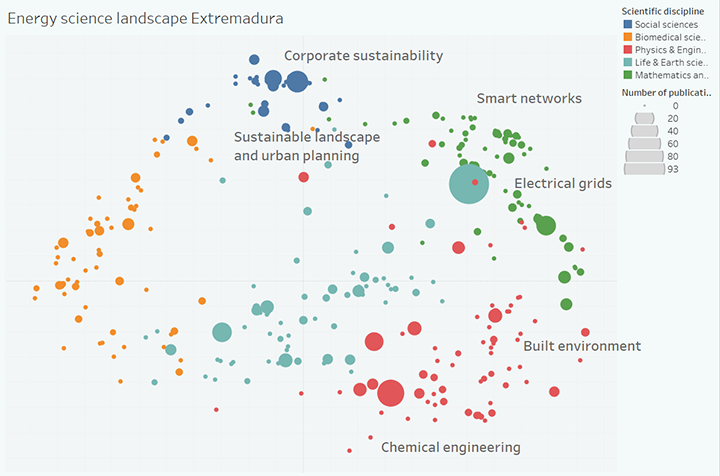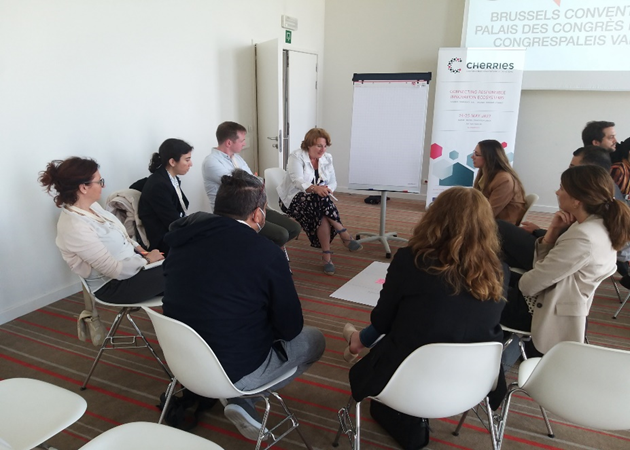Cocreating science that society needs: introducing the EXPLORE approach
How can local knowledge production help regions to create more sustainable and inclusive societies? This post will delve deeper in how we combined the core concepts of Responsible Research and Innovation (RRI) and smart specialisation and how this developed into the EXPLORE methodology.
The EXPLORE methodology was developed in the context of the two territorial RRI projects CHERRIES and RIPEET (H2020) that CWTS is participating in since 2020. It can assist territories in developing more innovative, inclusive, and self-sustaining R&I ecosystems by ensuring bottom-up involvement of all kinds of local stakeholders and citizens. This blogpost follows up on the first RIPEET CHERRIES blogpost that explains what these projects are about and what CWTS has learned from working at the science-society interface.
RRI & SMART Specialisation
The core concept in both projects is RRI. This policy approach anticipates and assesses potential implications and societal expectations with regard to research and innovation, with the aim to foster the design of inclusive and sustainable research and innovation. It implies that societal actors (researchers, citizens, policy makers, business, third sector organisations, etc.) work together during the whole research and innovation process in order to better align both the process and its outcomes with the values, needs and expectations of society. In practice, RRI is implemented as a package that includes multi-actor and public engagement in research and innovation. RRI thus enables easier access to scientific results, the take up of gender equality and ethics in the research and innovation content and processes, and formal and informal science education. RRI actions such as fostering co-creation and demand driven R&I in an open and responsible way can be a complex matter due to the plurality of actors involved and the socio-cultural divergences between the different geographical areas in Europe. However, it can also be a great opportunity for growth if it is done effectively. However, neither the theory, policy nor practice of RRI pays attention to the spatial dimension of research and innovation processes. As a consequence, RRI practices often ignore the various ways in which regional context affects not only the development of innovation but also the perception of what is responsible and socially desirable.
‘Smart Specialisation’ is an innovation policy concept intended to promote the efficient and effective use of public investment in research. Its goal is to boost regional (territorial) science and innovation in order to achieve economic growth and prosperity, by enabling regions to pursue new developments by making use of their local strengths. It has been gaining importance for innovation policy because of the role of proximity and the presence of knowledge-related institutions in associated fields are thought to have a positive influence. Thereby, the smart specialisation strategy (RIS3) programme is the most ambitious and endowed approach of EU-funded territorial innovation policies so far. However, the potential implications and societal expectations with regard to research and innovation have often been ignored in the smart specialisation discourse and the entrepreneurial development process that should support S3.
The European Commission recently launched the new smart specialisation policy framework; S4. S4 specifically focuses on sustainable innovation, which aims at demand driven social innovation that should bring long lasting systemic changes and green innovation to the European regions. This requires not only a well-designed priority portfolio tailored to the region, but also active participation from regional actors and a regional learning process. The concept of regional participation, experimentation and initiatives to achieve desired social transformative change originates from the third frame of innovation policy, regarded in literature as the most recent paradigm in which to view innovation policy (distinguished from two earlier framings related to R&D and national systems of innovation). These social transformations that S4 targets are often very complex with many stakeholders involved, take place on different levels of society and are of systemic nature. Therefore, S4 calls for a directional systemic approach in which a diverse set of local actors determine the directions to take collectively. To support regions in this process, methodologies, tools and workshop formats have to be developed to guide regions in for instance stakeholder engagement, regional mapping, target setting, working backwards from goals, and reflection and evaluation. The European Commission is working on the S4 Playbook in which these type of approaches are collected to assist the regions here. Although a helpful support, regions will likely differ a lot in their nature, needs and questions, which means that often a case to case assessment is required.
RRI X SMART SPEC (S4)
It is especially in S4 that smart specialisation and RRI can be well aligned, given that both concepts address demand driven, social and inclusive developments in a participatory process involving regional actors. Combining the two concepts has the potential to better align research with local societal demands and to bring new research insights to society more effectively. This combination is a new one that CWTS has implemented in both CHERRIES and RIPEET by conducting a mixed method approach. On the one hand regional data was collected on scientific output, technological development, actors and policy programs. On the other hand regional discussion groups were organised in which all types of regional actors could voice their innovation needs and ideas as well as comment upon the collected regional data. This was very much an iterative process in which we went back and forth between the data and regional actors multiple time. Nevertheless, in the end we ended up with a comprehensive overview of the regional innovation ecosystem of which the data was screened by regional actors and in which the societal needs voiced by the regional actors could be evaluated by the regional data.
Expertise at CWTS
CWTS is very well positioned to conduct this type of analysis, as it had expertise in multiple related areas. In the first place CWTS is a mixed method institute with both quantitative and qualitative expertise, which fits this type of analysis well. It also has been involved in many related projects focusing on topics like the sustainable development goals (STRINGS), participatory processes (Knowledge Ecosystems), scientific and technological data analysis (RISIS), innovation dynamics (H2020 projects) and development of a monitoring framework for responsible R&I practices (SUPER MoRRI). An approach that combines these elements enables CWTS to put its knowledge and expertise in practice and support transitions that benefit society. Moreover, participating in such projects helps to align the research conducted at the institute with present-day questions that arise in societal, scientific and policy communities.
EXPLORE
In order to facilitate local knowledge production and experimentation that help regions to create more sustainable and inclusive societies, CWTS recently launched the EXPLORE (EX(ploring) P(articipatory) L(ocal) O(pen) responsible R(&I) E(cosystems) methodology. As the acronym suggests, it combines the fundamental building blocks of RRI and S4 into an accessible R&I approach. We do this by integrating heterogeneous elements like group workshops, process evaluation and territorial mapping under the same methodological umbrella in a modular format. This modular format enables us to select the specific elements that a given territorial societal demand requires, thus making the approach very flexible to any kind of territory or challenge. Moreover, this approach helps to avoid the “one policy fits all” pitfall by enabling a bottom-up approach and taking the region specific situation as the starting point of each assessment. The EXPLORE methodology enables CWTS to be more involved in local and regional experimentation and innovation, the co-creation of new priority targets and policy mixes, the monitoring and evaluation of these processes, and social transformative change in general.
What includes EXPLORE
The modular building blocks in EXPLORE can be stored under three main important innovation processes: Mapping, priority setting & transition process and monitoring & evaluation (M&E).
Firstly, EXPLORE can help territories to get an overview of their R&I landscape by offering different mapping analyses. This is an important understanding for governments and societal actors alike, because it provides the basis from which new plans, strategies, experiments and innovation in general can be developed. Among these analyses are for instance stakeholder discussion sessions that identify barriers and opportunities in the R&I system together with the local actors. Also the policy landscape can be analysed to identify what opportunities for experimentation already exist and where gaps may be found that should be addressed. Lastly, EXPLORE also offers extensive data analysis of the regional knowledge landscape based on publication and patent output with visualisations that show in a glance where the relative capabilities of the territory are located in a given innovation field. One such approach is the Science Landscape, as shown below for the energy field in Extremadura.

Secondly, EXPLORE can also assist in priority setting and in the transition process
itself. The included tools help government and local actors to make difficult choices, approach complex challenges outside their usual scope and initiate experimentation. It can provide hints for prioritisation compliant to the smart specialisation rationale based on local knowledge data analysis that should then be combined with local actor input. It provides further assistance tools by a wide variety of workshop options to get closer to the desired priorities and outcomes. Among these are for instance workshops that structure the local needs present, visioning workshops that constitute a vision of what could be achieved and backcasting exercises that work out how to get to a desired future. In all these workshops participants are challenged to keep an open mind, local actors are heavily involved and exercises are flexible to adhere to the local context.

CHERRIES Policy Labs session in Brussels (May 2022)
Lastly, EXPLORE can assist in the monitoring and evaluation of ongoing prioritisation and experimentation. Monitoring and evaluation is crucial in every innovation process, as it checks whether the process is on track to reach its desired goals, participating actors are still on the same page and makes sure that the right changes can be made on the fly in a dynamic process. EXPLORE includes a wide spectrum of activities that can be deployed in this regard. These range from short and frequent like monitoring discussions or expert and stakeholder interviews to more intensive like on-site monitoring visits and impact workshops. M&E is guided by evaluative conversations rather than following up a set of indicators. The impact workshops can be general, but can also be more specific on a certain aspect where impact is challenging or highly desired to reach more specific feedback and results.
Conclusion
In a nutshell, with EXPLORE CWTS wishes to make the valuable insights of S4 and RRI more accessible and easier to apply in a practical context. This will give territories a stronger basis to develop successful and sustainable initiatives that serve society. Combined with a participatory transition process this has the potential to open more opportunity for experimentation and social initiatives. Hopefully, this will accelerate the transformation that all territories in Europe desperately strive for while strengthening local interests.








0 Comments
Add a comment